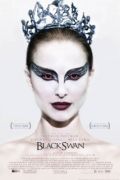
Directed by
Darren Aronofsky
108 minutes
Rated MA
Reviewed by
Andrew Lee

Black Swan
Synopsis: Nina (Natalie Portman) is a ballerina determined to achieve perfection. When she is awarded the dual roles of the White and Black Swan in Swan Lake, she pushes herself to extremes to try to embody the purity and innocence of the White Swan and the dark seductions of its black counterpart.Nobody does psychological and emotional breakdown better than Darren Aronofsky. Pi, Requiem For A Dream, The Fountain and The Wrestler all analyse people who break apart under the strain of pursuing their dreams or ideals. What sets an Aronofky film apart is the way that he draws you in, the subjective use of camera and sound putting you right inside the experience. It’s not always comfortable, anyone who’s seen Requiem For A Dream can attest to that, but there’s no denying the genius at work, drawing you in and then beating you up. Black Swan is no different, and after the more conventional approach taken in The Wrestler, it’s a welcome return to the more experimental and aggressive Aronofsky that I personally love. It feels very much like a companion piece to Pi, a lonely and introverted genius pushing themselves beyond their own limits, driving deep into psychosis to reach the perfection they seek. And the dark imagery used, the horrors of the real and imagined effects on Nina’s body recall some of Shinya Tsukamoto’s work, though it’s nowhere near the level of something like Tetsuo: The Iron Man.
The story itself is just a reworking of Tchaikovsky's Swan Lake. Nina, the sweet and pure ballerina meets Lily (Mila Kunis) a freer and somewhat suspect dancer who becomes both a friend and competitor after Nina is given the role of the Swan Princess. They vie for the attention and patronage of Thomas (Vincent Cassell), the artistic director of the ballet company. Thomas pushes Nina to embrace her dark side to help bring life to her performance of the Black Swan, something which Lily helps her to do while sabotaging her at the same time. And all the while, Nina is stalked by a doppelganger who might be real, or might just be a sign that she is genuinely losing her mind.
The pressures that ballet dancers face are unflinchingly depicted; Bruised feet, cracked toenails and brutal physiotherapy sessions are all shown with clinical detail. The psychological tortures of the bitchily competitive backstage world are also there in all their gory glory. But these are elements that are nothing particularly new, dance films have had them forever and a day. What sets Black Swan apart is the way that it combines psychological horror with the internecine backstage battles, highlighting the destructive nature of creativity and art, which all the while celebrates the results. And when Nina performs as the Black Swan, it is a celebration, a murderous triumph over herself that is the most visually striking moment in the entire film.
Black Swan is an experience you go through rather than think too deeply about. The story is basic, but everything that gets layered into it takes you to another place. The acting is superb, the cinematography claustrophobic and beautiful, and the overall result is something that will have you chewing on your thoughts for a while afterwards. I wasn’t sure immediately what I thought of it, but on reflection I think it’s a great film. It’s a very different kind of cinema experience, and in a world where most “arty” films are knowingly pretentious drivel, it’s refreshing to see something that does something different and confidently throws you inside the uncanny world of a disintegrating mind.

Want more about this film?


Want something different?




